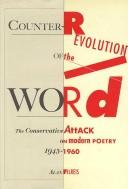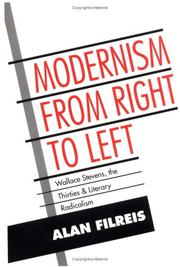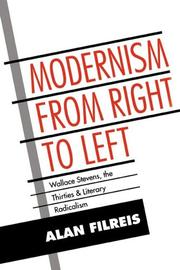| Listing 1 - 7 of 7 |
Sort by
|

ISBN: 9780807831625 080783162X Year: 2008 Publisher: Chapel Hill (N.C.) : University of North Carolina press,
Abstract | Keywords | Export | Availability | Bookmark
 Loading...
Loading...Choose an application
- Reference Manager
- EndNote
- RefWorks (Direct export to RefWorks)
American poetry --- Conservatism and literature --- Modernism (Literature) --- Politics and literature --- History and criticism. --- History --- 20th century --- History and criticism --- United States

ISBN: 0521453844 Publisher: Cambridge Cambridge University Press
Abstract | Keywords | Export | Availability | Bookmark
 Loading...
Loading...Choose an application
- Reference Manager
- EndNote
- RefWorks (Direct export to RefWorks)
American poetry --- Modernism (Literature) --- Nineteen thirties. --- Political poetry, American --- Radicalism in literature. --- History and criticism. --- Poetry --- Thematology --- Stevens, Wallace --- anno 1900-1999

ISBN: 1469606631 9781469606637 9780807831625 080783162X 9798890882134 Year: 2008 Publisher: Chapel Hill University of North Carolina Press
Abstract | Keywords | Export | Availability | Bookmark
 Loading...
Loading...Choose an application
- Reference Manager
- EndNote
- RefWorks (Direct export to RefWorks)
During the Cold War an unlikely coalition of poets, editors, and politicians converged in an attempt to discredit--if not destroy--the American modernist avant-garde. Ideologically diverse yet willing to bespeak their hatred of modern poetry through the rhetoric of anticommunism, these ""anticommunist antimodernists,"" as Alan Filreis dubs them, joined associations such as the League for Sanity in Poetry to decry the modernist ""conspiracy"" against form and language. In Counter-revolution of the Word Filreis narrates the story of this movement and assesses its effect on American poetry
Modernism (Literature) --- American poetry --- Conservatism and literature --- Politics and literature --- Literature and conservatism --- Literature --- History and criticism. --- History
Book
ISBN: 0691633045 0691603766 1400861705 9781400861705 9780691603766 069106864X 9780691068640 1322018464 Year: 1991 Publisher: Princeton, N.J. Princeton University Press
Abstract | Keywords | Export | Availability | Bookmark
 Loading...
Loading...Choose an application
- Reference Manager
- EndNote
- RefWorks (Direct export to RefWorks)
The work of Wallace Stevens has been read most widely as poetry concerned with poetry, and not with the world in which it was created; deemed utterly singular, it seems to resist being read as the record of a life and times. In this critical biography Alan Filreis presents a detailed challenge to this exceptionalist view as he traces two major periods of Stevens's career from 1939 to 1955, the war years and the postwar years. Portraying Stevens as someone whose alternation between cultural comprehension and ignorance was itself characteristically American, Filreis examines the poet's impulse to disguise and compress the very fact of his debt to the actual world. By actual world Stevens meant historical conditions, often in order to impugn his own interest in such externalities as the last resort of a man whose famous interiority made him feel desperately irrelevant. In light of events ranging from the U.S. entry into World War II to the Cold War, Filreis shows how Stevens was driven to make a "close approach to reality" in an effort to reconcile his poetic language with a cultural language. "Wallace Stevens and the Actual World is not only an impressive feat of historical recovery and analysis, but also a pleasure to read. It will be useful to anyone interested in the relationship between American politics and literature during World War II and the Cold War."--Milton J. Bates, Marquette UniversityOriginally published in 1991.The Princeton Legacy Library uses the latest print-on-demand technology to again make available previously out-of-print books from the distinguished backlist of Princeton University Press. These editions preserve the original texts of these important books while presenting them in durable paperback and hardcover editions. The goal of the Princeton Legacy Library is to vastly increase access to the rich scholarly heritage found in the thousands of books published by Princeton University Press since its founding in 1905.
Reality in literature. --- History, Modern, in literature. --- War poetry, American --- World War, 1939-1945 --- Political poetry, American --- Politics and literature --- World War, 1939-1945, in literature --- History and criticism. --- Literature and the war. --- History --- Stevens, Wallace, --- Knowledge --- History. --- Political and social views. --- Poetry --- Stevens, Wallace --- anno 1900-1999
Book
ISBN: 023155429X Year: 2021 Publisher: New York : Columbia University Press,
Abstract | Keywords | Export | Availability | Bookmark
 Loading...
Loading...Choose an application
- Reference Manager
- EndNote
- RefWorks (Direct export to RefWorks)
In 1960, when World War II might seem to have been receding into history, a number of artists and writers instead turned back to it. They chose to confront the unprecedented horror and mass killing of the war, searching for new creative and political possibilities after the conservatism of the 1950s in the long shadow of genocide.Al Filreis recasts 1960 as a turning point to offer a groundbreaking account of postwar culture. He examines an eclectic group of artistic, literary, and intellectual figures who strove to create a new language to reckon with the trauma of World War II and to imagine a new world. Filreis reflects on the belatedness of this response to the war and the Holocaust and shows how key works linked the legacies of fascism and antisemitism with American racism. In grappling with the memory of the war, he demonstrates, artists reclaimed the radical elements of modernism and brought forth original ideas about testimony to traumatic history.1960 interweaves the lives and works of figures across high and popular culture—including Chinua Achebe, Hannah Arendt, James Baldwin, Amiri Baraka, Paul Celan, John Coltrane, Frantz Fanon, Roberto Rossellini, Muriel Rukeyser, Rod Serling, and Louis Zukofsky—and considers art forms spanning poetry, fiction, memoir, film, painting, sculpture, teleplays, musical theater, and jazz. A deeply interdisciplinary cultural, literary, and intellectual history, this book also offers fresh perspective on the beginning of the 1960s.

ISBN: 0521619408 Year: 2005 Publisher: Cambridge Cambridge university press
Abstract | Keywords | Export | Availability | Bookmark
 Loading...
Loading...Choose an application
- Reference Manager
- EndNote
- RefWorks (Direct export to RefWorks)
American poetry --- Modernism (Literature) --- Nineteen thirties --- Political poetry, American --- Radicalism in literature --- History and criticism --- Stevens, Wallace, --- Political and social views.
Digital
ISBN: 9781400861705 9780691603766 Year: 2014 Publisher: Princeton, N.J. Princeton University Press
Abstract | Keywords | Export | Availability | Bookmark
 Loading...
Loading...Choose an application
- Reference Manager
- EndNote
- RefWorks (Direct export to RefWorks)
| Listing 1 - 7 of 7 |
Sort by
|

 Search
Search Feedback
Feedback About UniCat
About UniCat  Help
Help News
News